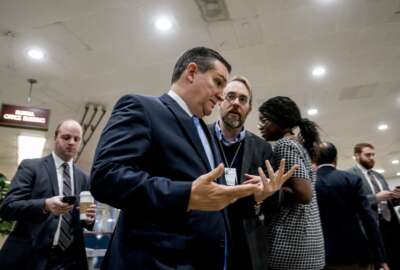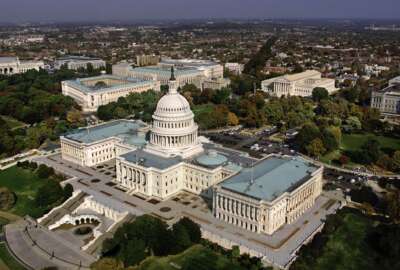
Here’s how a shutdown would affect your pay and benefits
A government "shutdown" isn't really a shutdown. Many services will continue, but hundreds of thousands of federal workers will be forced off the job, and some ...
Get the latest news about the government shutdown first. Sign up for our breaking news alerts.
The world won’t end if Congress can’t find a way to pass a funding bill before this weekend.
The truth about a government “shutdown” is — the government doesn’t really shut down.
Social Security checks will still go out. Troops will remain at their posts. Doctors and hospitals will receive their Medicare and Medicaid reimbursements. In fact, virtually every essential government agency, like the FBI, the Border Patrol and the Coast Guard, will remain open. Transportation Security Administration officers will continue to man airport checkpoints.
But hundreds of thousands of federal workers will be forced off the job, and some services will go dark.
The head of the largest union representing government workers urged lawmakers Wednesday to avert a shutdown. “It is very clear that a federal government shutdown could inflict serious pain on everyday working people,” said American Federation of Government Employees National President J. David Cox in a letter.
Besides furloughing more than 850,000 federal workers, Cox said an impact would be felt by those outside of government who visit museums, parks or zoos, as well as six million businesses who depend on financial support from small business loans.
House Democrats reminded President Donald Trump of their legislative priorities in a letter Thursday.
“If we can’t agree, your party has the majority in the House and the Senate to pass your own funding resolution,” 171 Democratic members wrote. “But that will be a bill we cannot support.”
In the event Congress can’t avert a government shutdown, here are four things to remember.
Federal employees can also find the Office of Personnel Management’s guidance for shutdown furloughs, which it last updated in 2015.
Employees at the Defense Department should also check DoD’s own procedures in the event of a government shutdown.
You’ll probably still get paid
Federal employees furloughed during the shutdown in 2013 did receive back pay for the 16 days the government remained closed. Congress included a provision in its October 2013 spending bill that reopened the government and authorized that furloughed employees receive “their regular standard rate of compensation for the period of such lapse in appropriations, as soon as practicable.”
If similar events occur at the end of the week, several congressmen have already said they want to make sure federal employees get paid.
Lawmakers have introduced various pieces of legislation to make sure federal employees receive compensation if furloughed for any period of time where there’s a lapse in appropriations.
Reps. Don Beyer (D-Va.) and Rob Wittman (R-Va.) reintroduced on Thursday afternoon the Federal Employee Retroactive Pay Fairness Act, which will guarantee that federal employees receive back pay in the event Congress can’t come to an agreement on a funding solution.
“Federal employees should not be penalized for Congress’ inability to get its job done on time,” Wittman said in a statement. “This legislation sends a clear signal to our federal workers that they will not be harmed in the unfortunate event of a shutdown. While this legislation would minimize the impacts of funding uncertainty, my focus remains on returning Congress to a regular schedule of budgeting and passing appropriations bills.”
Sen. Ben Cardin (D-Md.) has also introduced similar legislation in the past.
‘Excepted’ positions
Federal employees who perform “emergency work involving the safety of human life or the protection of property” or other types of work will be “excepted” from shutdown furloughs.
Otherwise, federal employees whose salaries are funded through annual appropriations will be asked not to work.
Since most political appointees are not subject to furloughs, because they are not part of the Title 5 leave system, most will continue to work during a shutdown.
Typically, agency legal counsels and senior managers designate who serves in “excepted” or “non-excepted” functions. Individual agencies have more details on this topic in their contingency plans, though most haven’t been updated since September 2015.
Each agency will generally decide when and how it will notify employees of their status. “Excepted” employees who work during a government shutdown will generally get paid after Congress passes and the president signs another continuing resolution or appropriations package.
Your health benefits will continue
Federal employees will continue to receive their health benefits even if their agency doesn’t make premium payments on time.
“Since the employee will be in a non-pay status, the enrollee share of the [Federal Employee Health Benefits Program] premium will accumulate and be withheld from pay upon return to pay status,” OPM wrote in its shutdown guidance.
Furloughed employees enrolled in the Federal Employees’ Group Life Insurance (FEGLI) Program can continue to receive coverage for 12 consecutive months without cost to the worker or the agency.
Coverage will continue for enrollees in the Federal Long Term Care Insurance Program as long as premiums are paid, but automatic payroll deductions will stop for furloughed employees.
“If Long Term Care Partners does not receive payment for three consecutive pay periods, they will begin to direct bill the enrollee,” OPM said. “The enrollee should pay premiums directly billed to him/her on a timely basis to ensure continuation of coverage.”
Federal retirees under both the Federal Employees Retirement System (FERS) and Civil Service Retirement System (CSRS) will continue to receive scheduled annuity payments.
The Thrift Savings Plan will operate as normal during a government shutdown. Furloughed employees enrolled in the TSP will not be able to make contributions to the plan while they’re not getting paid. TSP participants can request a financial hardship withdrawal, though certain conditions apply.
Costly and unproductive
Both Congress and the Trump administration have their own political reasons for averting a government shutdown, but past shutdowns point to other, practical ones as well.
During the last government shutdown in 2013, federal employees collectively missed 6.6 million days of work, according to Office of Mangement and Budget estimates. The 16-day shutdown cost the government roughly $2.5 billion in lost productivity.
The Defense Department lost the most days, 1.6 million, followed by the departments of Treasury (985,000), Agriculture (737,000) and Interior (646,000).
Copyright © 2024 Federal News Network. All rights reserved. This website is not intended for users located within the European Economic Area.
Nicole Ogrysko is a reporter for Federal News Network focusing on the federal workforce and federal pay and benefits.
Follow @nogryskoWFED





